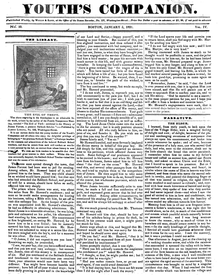Youth's Companion

Youth's Companion, 1831
|
|
| Categories | children's magazine |
|---|---|
| Founder | Perry Mason |
| First issue | 1827 |
| Final issue | 1929 |
| Company | Perry Mason & Co. |
| Country | United States |
| Based in | Boston |
| Language | English |
The Youth's Companion (1827–1929), known in later years as simply The Companion—For All the Family, was an American children's magazine that existed for over one hundred years until it finally merged with The American Boy in 1929. The Companion was published in Boston, Massachusetts by the Perry Mason Company (later renamed "Perry Mason & Co." after the founder died). From 1892 to 1915 it was based in the Youth's Companion Building, which is now on the National Register of Historic Places.
Early issues of the Companion were centered on religion, having been created, in the words of its first publishers Nathaniel Willis (father of Nathaniel Parker Willis) and Asa Rand, to encourage "virtue and piety, and ... warn against the ways of transgression". In its early years its circulation did not reach 5,000.
Through the years, publishers included Willis & Rand (Washington St., c. 1831); Olmstead & Co., (School St., c. 1857); and Perry Mason & Co. (Washington St., ca.1868; Temple Place, c. 1873–1888; and Columbus Ave.; c. 1894).
In the 1890s its content was re centered on entertainment, and it began to target adults as well as children with pieces contributed by writers such as Harriet Beecher Stowe, Mark Twain, Emily Dickinson, Booker T. Washington, and Jack London. Another innovation was a medical column for older readers. In consequence, its circulation increased one-hundredfold, with sales peaking in 1893. It was advertised in 1897 as "an Illustrated Family Paper", having, as one person said of it, done "away with childish things". It did, however, retain a children's section, which included short poems and puzzles, and in faith to its beginnings, however, The Youth's Companion did not mention nor advertise drugs or alcohol, nor did it delve much into politics; when it did, it usually did so in a humorous way.
...
Wikipedia
